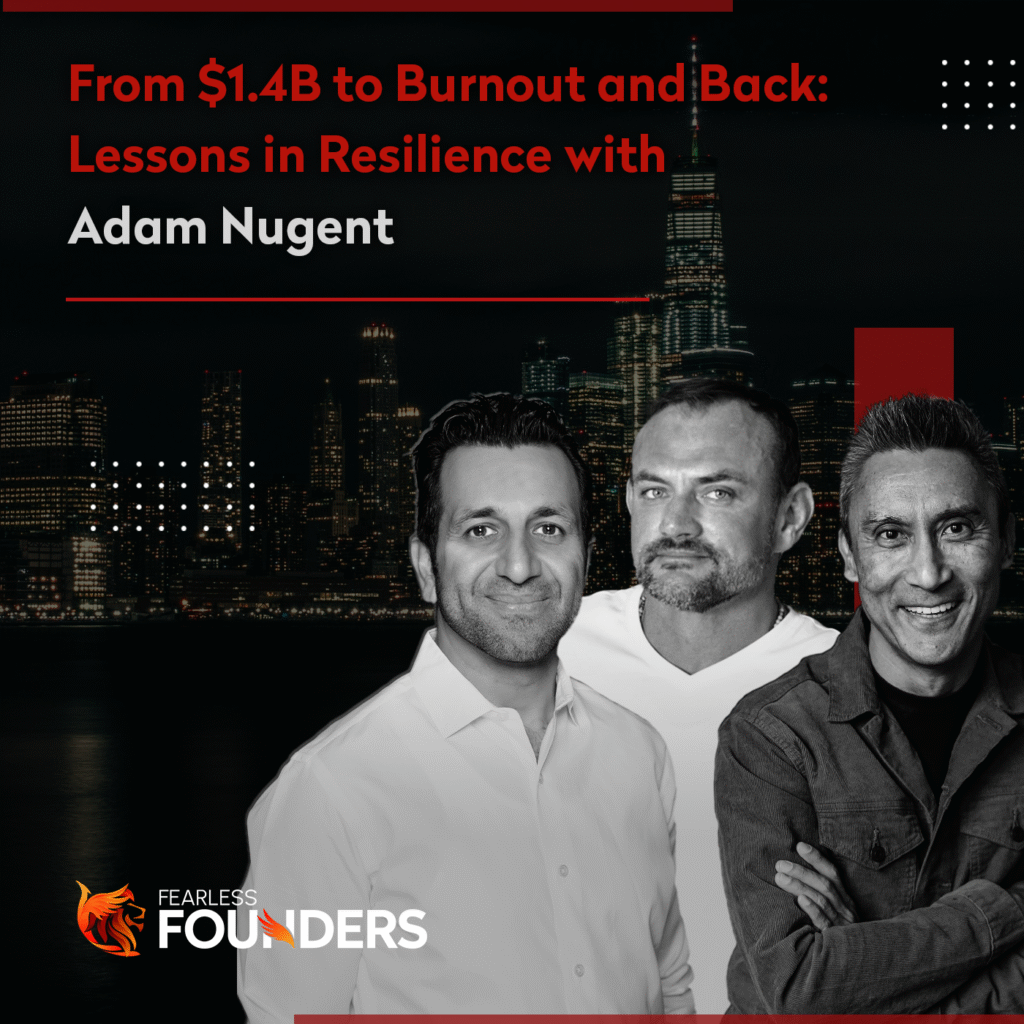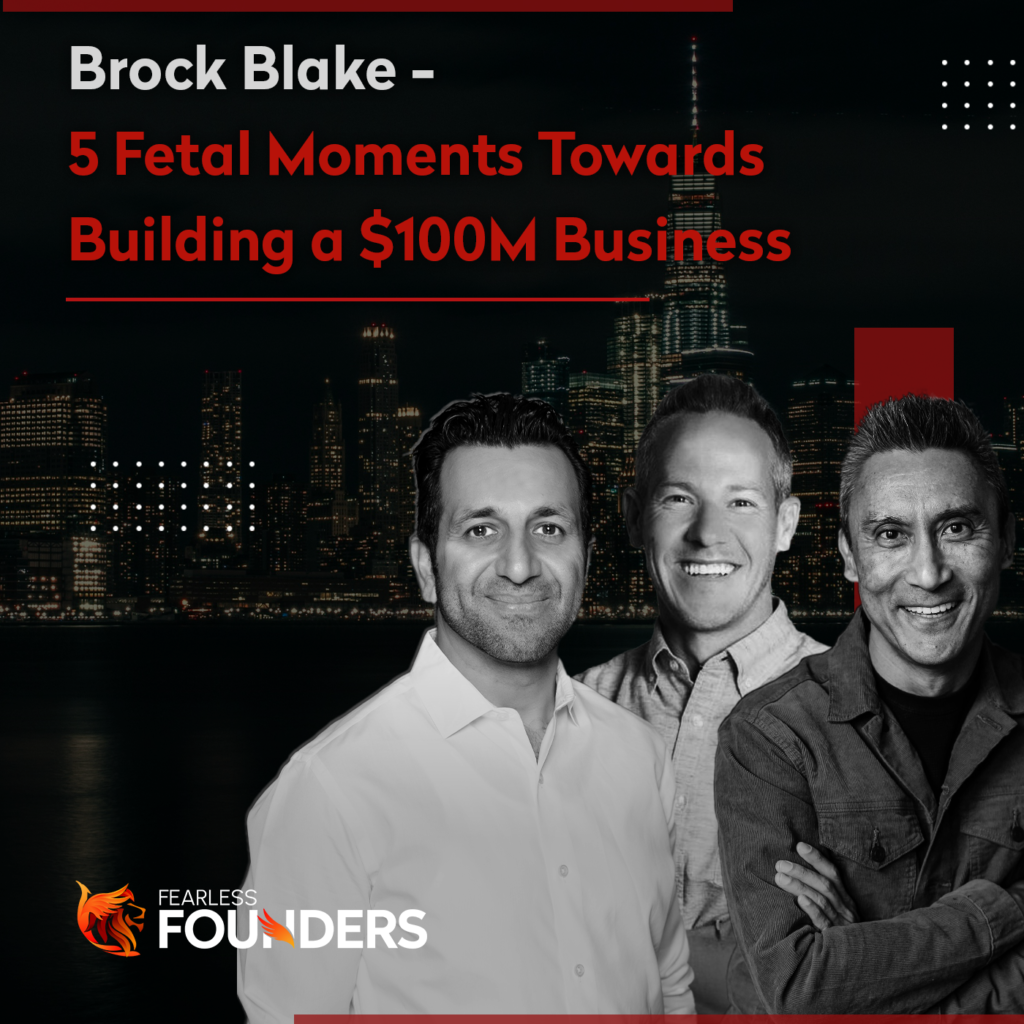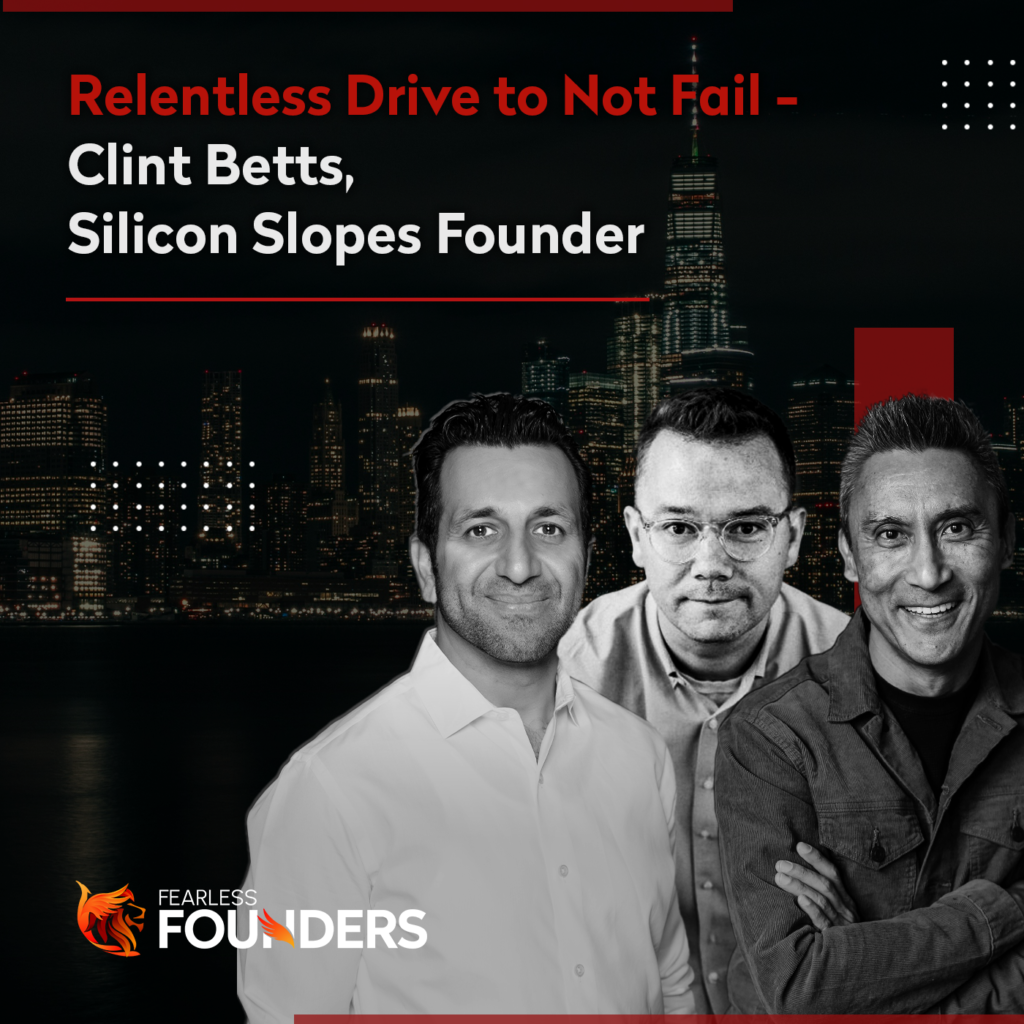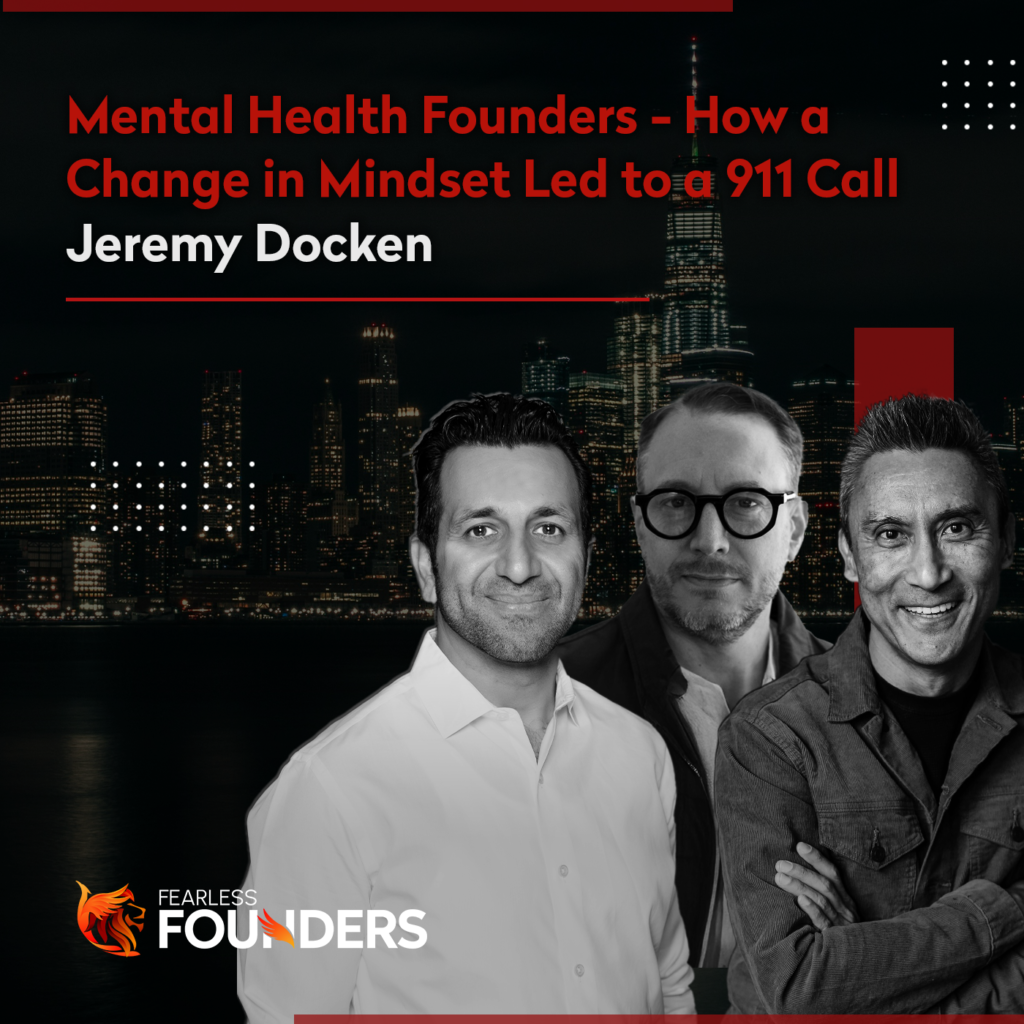Mental Health for Founders – How a Change in Mindset Led to a 911 Call
Founders are humans, and so they also have what we call the Silent Struggle of being Business Founders. Entrepreneurs are often portrayed as having a glamorous journey of innovation, determination, and financial success. The reality is much more challenging than that. And founders, especially those leading VC-backed start-ups, experience levels of stress, burnout, and even mental health crises that are incredibly high.
In a recent episode of Fearless Founders, the host sat down with Jeremy Docken, a seasoned entrepreneur who built a successful, VC-funded business but faced a breaking point that nearly cost him everything. Where in a moment of his life, his team had to call 911. His narrative sheds light on the hidden mental health struggles of business leaders and why prioritizing self-care and sustainable leadership is essential.
The Breaking Point: When Leadership Becomes Overwhelming
For many start-up founders, the weight of leadership is all-consuming. They are responsible for securing funding, scaling operations, and managing employees—all while maintaining a facade of confidence. Jeremy Docken was no exception.
He was a founder of a growing healthcare technology company. For years, he juggled high-stakes investor meetings, product development, and operational challenges that weighed on the business. There was so much pressure that his physical and mental health started to deteriorate. He ignored all the warning signs: exhaustion was just part of being a leader.
Then, it happened—his body and mind could no longer keep up. He began acting in such a manner that his team couldn’t endure anymore, and they thus called 911 to ensure he reached the hospital immediately. The moment served as a wake-up call: leadership has to be carried out without ruining personal well-being.
The Illusion of Invincibility: Why Founders Ignore Mental Health
Jeremy’s story is not unique. Many entrepreneurs buy into the belief that sacrificing their health is necessary for success. The culture of hustle and grind convinces founders that working 16-hour days and neglecting self-care are signs of dedication.
- Burnout and Exhaustion: Continuous working means chronic fatigue syndrome and reduced performance.
- Investor Pressure: The pressure to fail and VC expectations keep inducing stress.
- Isolation and Loneliness: Many founders feel they have no one to turn to.
- Imposter Syndrome: Even successful founders doubt their abilities and worthiness.
For Jeremy, the realization came too late—but it forced him to rethink his priorities.
Shifting Priorities: Putting Mental Health First
After his health crisis, Jeremy made a critical decision: to restructure his priorities. Before, he was focused on these three key factors:
- Company First
- Family second
- Self last
The factors above weren’t sustainable, so he reversed it to the following:
- Self-care first – Without a healthy mind and body, he couldn’t lead effectively.
- Family second – Strengthening personal relationships provided emotional resilience.
- Company third – A thriving business relies on a thriving leader.
Jeremy learned that prioritizing self-care isn’t selfish—it’s strategic. A founder who is mentally and physically well makes better decisions, leads more effectively, and creates a healthier work culture.
Breaking the Silence: The Importance of Support and Coaching
One of the biggest mistakes entrepreneurs make is believing they have to do everything alone. Jeremy now advocates for peer support, coaching, and mentorship as essential tools for sustaining long-term success.
Ways Founders Can Protect Their Mental Health:
- Find a Support Network: Connect with other founding teams who understand the stressors of leadership.
- Invest in Coaching or Therapy: Coaching or therapy for mental health helps cope with the situation.
- Set Boundaries: Set boundaries on work hours, delegate tasks, and get rest.
- Open Up About Obstacles: Breaking the silence helps reduce the stigma and encourage healthier practice in leadership.
Self-care and seeking help prevent founders from hitting the crisis point and building stronger, more resilient businesses.
Conclusion
Jeremy Docken’s case is a wake-up call that success in entrepreneurship should not cost one’s mental health. Entrepreneurs and VC-backed founders, as well as business leaders, must acknowledge that sustainable leadership starts with self-care. A lesson for business founders is that they must also take care of their well-being as much as the growth of their business. A thriving company needs a healthy, balanced, and resilient leader.
Find out the untold stories of successful businesses on the Fearless Founders podcast: https://fearlessfounders.club/ with Ike and Benoy. Listen to an insider’s perspective on the entrepreneurial journey: celebrating triumphs, navigating challenges, and finding valuable lessons along the way. Tune in now on YouTube and Spotify to get inspired by real experiences from industry leaders.

In this episode of Fearless Founders, Ike & Benoy sit down with MIT-trained CTO Keith Deutsch, who has helped shape over 30 startups from the ground up. Keith shares hard-earned insights on building successful tech products, navigating founder blind spots, and avoiding costly missteps between version 1 and version 2. Whether you’re a first-time founder or scaling your startup, this conversation is packed with lessons you won’t want to miss.

Adam opens up about the collapse of his business, the emotional aftermath, and his journey through rock bottom toward personal and professional reinvention. From the pitfalls of chasing external validation to the power of rebuilding your identity, this conversation is packed with hard-won wisdom for every entrepreneur navigating risk, growth, and purpose.

In Episode 29 of Fearless Founders, hosts Benoy Tamang and Ike Kavas welcomed Abby Martin, HR expert and President of Amplēo HR, for a deep dive into what truly drives scalable, people-first growth in startups.

In this episode 28 of Fearless Founders, Brock Blake, co-founder and CEO of Lendio, shares the unfiltered reality behind building a $100M business. He walks us through five pivotal “fetal position” moments—those gut-wrenching lows that tested his resolve, leadership, and belief in the mission.

In Episode 27 of Fearless Founders, we sit down with Fengmin Gong, a pioneering technologist and four-time exited founder, known for his instrumental roles in building companies like Palo Alto Networks and CipherOptics.

In this episode of Fearless Founders, Jeremy Glauser, a three-time exit entrepreneur, shares his journey of building and scaling multiple businesses. He opens up about the challenges of entrepreneurship, from navigating market timing to the emotional toll of setbacks.

In Episode 25 of Fearless Founders, we sit down with Tom Turner, a visionary leader in cybersecurity and a seasoned entrepreneur with multiple successful exits. With a career spanning decades in the tech industry, Tom shares his insights on building and scaling startups, aligning sales and marketing for growth, and the critical role of leadership in fast-moving industries.

In Episode 24 of Fearless Founders, Peter Harris, Managing Director of University Growth Fund, shares his remarkable journey from real estate and micro-franchising in Ghana to leading a venture fund in Utah. With years of experience evaluating startups and raising capital, Peter offers invaluable insights into when to raise funds, navigating investor relationships, and building successful businesses.

In this episode 23 of Fearless Founders, our guest, Clint Betts is a key figure in the startup and tech community, best known for founding Silicon Slopes and Kokomo. He has played a major role in fostering entrepreneurship, connecting leaders, and shaping Utah’s tech landscape.

In this episode 22 of Fearless Founders, Jeremy Docken is a seasoned entrepreneur and founder of Calderas, a healthcare technology company. With a background in accounting and forensic finance at Arthur Andersen and KPMG, he transitioned into the tech and pharmaceutical space, building innovative solutions.


